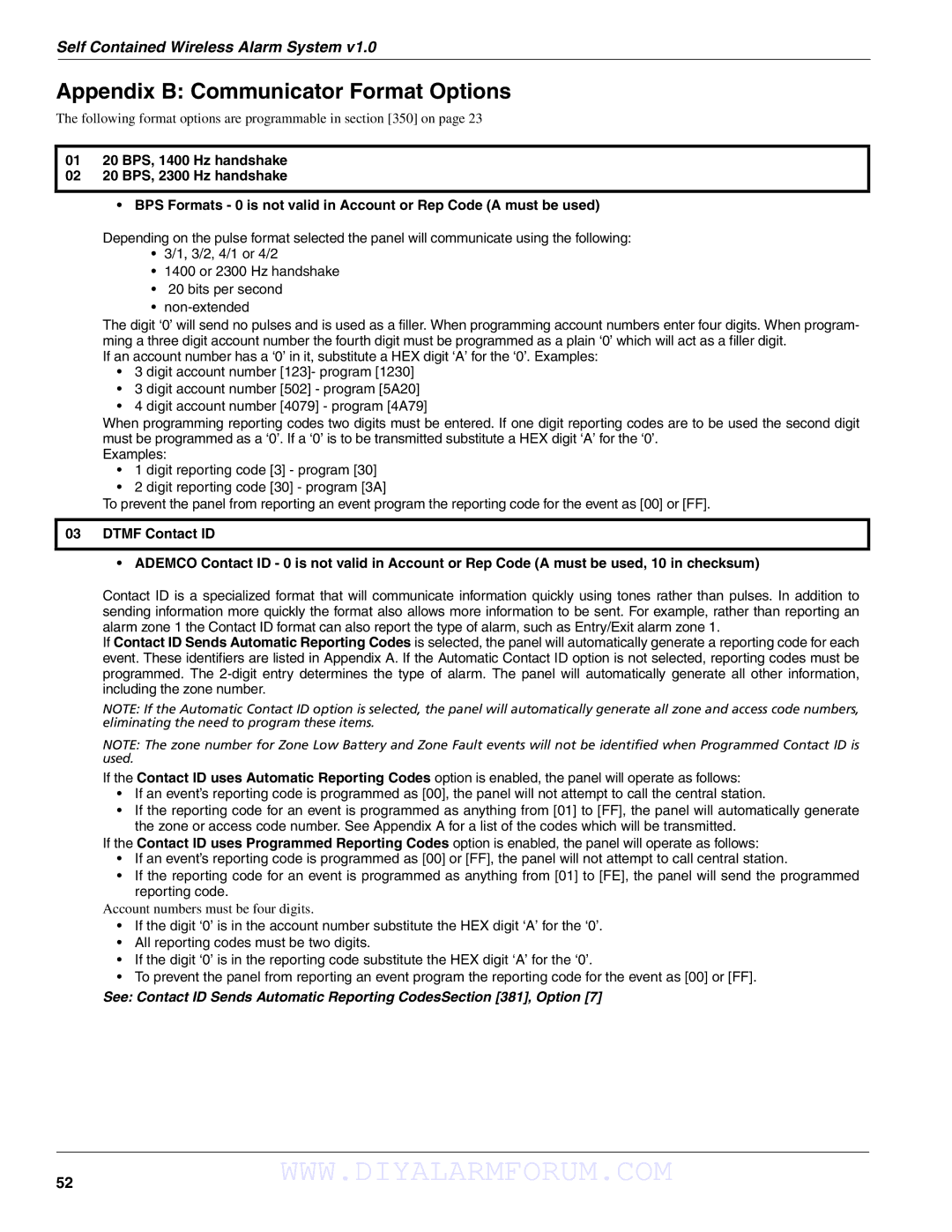
Self Contained Wireless Alarm System v1.0
Appendix B: Communicator Format Options
The following format options are programmable in section [350] on page 23
0120 BPS, 1400 Hz handshake
0220 BPS, 2300 Hz handshake
•BPS Formats - 0 is not valid in Account or Rep Code (A must be used)
Depending on the pulse format selected the panel will communicate using the following:
•3/1, 3/2, 4/1 or 4/2
•1400 or 2300 Hz handshake
•20 bits per second
•
The digit ‘0’ will send no pulses and is used as a filler. When programming account numbers enter four digits. When program- ming a three digit account number the fourth digit must be programmed as a plain ‘0’ which will act as a filler digit.
If an account number has a ‘0’ in it, substitute a HEX digit ‘A’ for the ‘0’. Examples:
•3 digit account number [123]- program [1230]
•3 digit account number [502] - program [5A20]
•4 digit account number [4079] - program [4A79]
When programming reporting codes two digits must be entered. If one digit reporting codes are to be used the second digit must be programmed as a ‘0’. If a ‘0’ is to be transmitted substitute a HEX digit ‘A’ for the ‘0’.
Examples:
•1 digit reporting code [3] - program [30]
•2 digit reporting code [30] - program [3A]
To prevent the panel from reporting an event program the reporting code for the event as [00] or [FF].
03DTMF Contact ID
•ADEMCO Contact ID - 0 is not valid in Account or Rep Code (A must be used, 10 in checksum)
Contact ID is a specialized format that will communicate information quickly using tones rather than pulses. In addition to sending information more quickly the format also allows more information to be sent. For example, rather than reporting an alarm zone 1 the Contact ID format can also report the type of alarm, such as Entry/Exit alarm zone 1.
If Contact ID Sends Automatic Reporting Codes is selected, the panel will automatically generate a reporting code for each event. These identifiers are listed in Appendix A. If the Automatic Contact ID option is not selected, reporting codes must be programmed. The
NOTE: If the Automatic Contact ID option is selected, the panel will automatically generate all zone and access code numbers, eliminating the need to program these items.
NOTE: The zone number for Zone Low Battery and Zone Fault events will not be identified when Programmed Contact ID is used.
If the Contact ID uses Automatic Reporting Codes option is enabled, the panel will operate as follows:
•If an event’s reporting code is programmed as [00], the panel will not attempt to call the central station.
•If the reporting code for an event is programmed as anything from [01] to [FF], the panel will automatically generate the zone or access code number. See Appendix A for a list of the codes which will be transmitted.
If the Contact ID uses Programmed Reporting Codes option is enabled, the panel will operate as follows:
•If an event’s reporting code is programmed as [00] or [FF], the panel will not attempt to call central station.
•If the reporting code for an event is programmed as anything from [01] to [FE], the panel will send the programmed reporting code.
Account numbers must be four digits.
•If the digit ‘0’ is in the account number substitute the HEX digit ‘A’ for the ‘0’.
•All reporting codes must be two digits.
•If the digit ‘0’ is in the reporting code substitute the HEX digit ‘A’ for the ‘0’.
•To prevent the panel from reporting an event program the reporting code for the event as [00] or [FF].
See: Contact ID Sends Automatic Reporting CodesSection [381], Option [7]
52WWW.DIYALARMFORUM.COM
